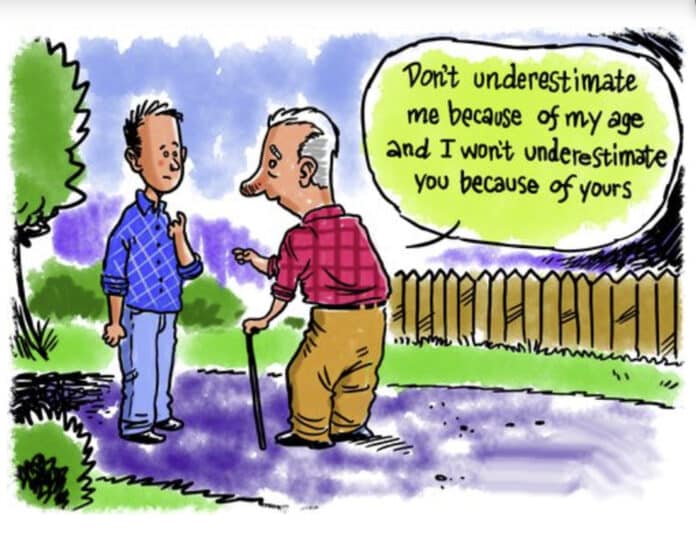Call it a trick question if you will, but you still need to come up with an answer as to what you believe divides the elders and the elderly in society. Like so many other imponderables, it depends on who you ask – and where.

Let us first take a look at the elders; what is this group, what is their faculty and what do they stand for? For centuries, in almost every culture, particularly in the East and in biblical teaching, older adults were placed on a pedestal of wisdom and respect.
The elders play a vital role in preserving and transmitting knowledge, traditions, customs, beliefs and general know how. The generation coming after elders can tap into a wealth of knowledge thus avoiding an awful lot of trial and error. Today, elders are still at the head of government in most countries, chief executives in manufacturing and top dogs in business and finance.
Our popular past-president and former UN High Commissioner for Human Rights, Mary Robinson, is the current chair of ‘The Elders’; an influential group which was formed in 2007 and included such luminaries as Nelson Mandela and Jimmy Carter. The movement is based on the Confucian teachings that most wisdom comes with age.
Hopefully the above paragraphs capture a little of the vital importance of the elders in society. So, moving on, let us now take a look at the section of today’s society known as ‘the elderly.’
The elderly are that inevitable generation of pensionable age – although a significant percentage continues to be notable business people, farmers, politicians, clergy, judges, broadcasters, writers and so on. In other words, the elderly still are at the forefront in the running of our country. But hold on a minute … isn’t that what the elders always did – being equipped with most of the knowledge and know how? So, why are there elders and elderly?
In a lot of people’s mind, the elderly are becoming the next big problem for society. You see, the way things are heading, there are going to be too many of us – which, allegedly, will cripple the generation coming after us with an unfair tax burden. Instead of being valued and respected, the elderly are already being looked upon in some quarters as the problem that will bankrupt the HSE, be constantly in someone’s way, and probably set fire to the chimney. The pension system will collapse under the weight of too many ‘elderly’, there will be insufficient availability of nursing-home beds, and nobody knows what to do about the problem.
When the motor car was invented there was a widely expressed concern as to how the planet might manage all the redundant horses. It is the same now with the elderly. We may even be in the same category as ‘rescue donkeys’, corralled somewhere and being showered with kindness by committed elderly lovers. Apart from the odd contrary elderly one, unhappy in captivity, most of us will be docile and friendly. We can expect to be fed and comforted with baby-talk. Harmless beings,– but like the rescued donkeys, good for nothing!
Western cultures are ageist. People are living longer and this fact should be celebrated for all its positives, instead of browbeating over the pension funds. I read somewhere of this fear being labeled as the ‘grey tsunami.’
Starting here and now, it is time the elders answered back. The word ‘elderly’ is herewith banished from dialogue. One word will in future cover my age group; ‘ELDERS!’
We are the generation who built the society we all live in. We carry the wisdom and produced the knowledge that made things better for the generations coming after us. Individuals, communities, countries and the world are improved by the furrows we ploughed.
Don’t judge us because we can’t programme the smart phone, scorn social media and refuse to store stuff in a ‘cloud.’ Some of us drew our first cat on old ration books – because we came into a world at war. We have lived through eight different decades, two different centuries and two different millenniums. We gave and took something from every one of those years. Life was tough – but we were tougher.
We remember our first radio and hearing the first GAA commentary from Michael O Hehir. We travelled a distance to make a phone call; moved from vinyl records through cassettes and CDs; moved from hand-written letters to fax and emails. So if we don’t give two hoots about gigabytes or megabytes maybe it’s because we cherish something more important.
TB, Polio, Covid and work-related accidents thinned out what are now the elders. We have lived through more changes than had occurred in the entirety before we were born. Every elder under the sun can truthfully claim to be adaptable. But maybe we have had enough – and if we appear nonplussed over the advantages of your ‘cloud’ – maybe it is because we learned how to store the important stuff in our heart.
Don’t Forget
The best classroom in the world is at the feet of an elderly person. (Andy Rooney, CBS)






